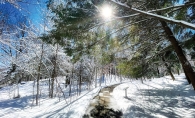“Some people ride to hunt, and some people hunt to ride.”
This is an old saying, according to Jeanne Ahrenholz of the Long Lake Hounds fox hunting club. Ahrenholz places herself in the “hunt to ride” category; it’s likely that the other members of the club do, too, as they gather for “hunts” each Wednesday and Saturday morning during the summer and fall.
It's important to note that, in this case, they’re not chasing a real fox; the “fox” is a rag that has been soaked in a mixture of fox urine and cooking oil, called a “stinky.” It's dragged by a rider at the end of a ski rope. Participants use specially bred hounds trained to pursue the “fox” based on its scent.
For people who enjoy English-style riding, fox hunting is “a great activity to do with your horse, a wonderful way to spend a couple hours doing something the horses generally enjoy—running,” says Ahrenholz, a 30-year member who is one of the club's joint masters. “And I enjoy the camaraderie. You get to be such good friends by sharing a common interest. And you get to know the landowners.”
Ahrenholz has a long-time involvement with horses, starting with show horses. She owned a saddle shop in Wayzata for 20 years. “The idea of fox hunting had always intrigued me; we had several customers who fox-hunted,” she says.
According to Ahrenholz, the horses don’t just instinctively know how to be fox hunters. “You have to train the horse to be a bit independent of the herd in order to control them, but in general, they love it. It's their nature to run with a herd of other horses.”
“The horses need to be very calm [and] can work with other horses around them and hounds under their feet. There's a lot going on,” says Nancy Bizzano, the club's other joint master. “They need to be like a good ranch horse.”
The season starts in late June and ends in November, with hunts in various west suburbs. The Long Lake Hounds club meets at the same location no more than twice each season, for variety's sake. The sites range from Medina to the east to as far west as Delano. The club, which began several decades ago as the Long Lake Trails Association, has agreements with about 210 area landowners, according to Ahrenholz.
The hunts are structured to accommodate riders of every skill level, Bizzano says. There are two “fields” of riders. The strongest riders stay with the hounds and travel faster. The second and third fields “go no faster than the slowest rider wants to go.” The hunts are not a competitive activity, Bizzano stresses. “You can go out and enjoy the ride and stay within yourself; there's no prize for staying on. We enjoy watching the hounds work.”
The hounds, prized for their ability to follow a scent, are exercised almost every day by members. When the dogs, which are owned by the club, become too old to hunt, usually around the age of 8, the club finds them “retirement homes.”
Participants wear traditional English-style riding clothes. But the stereotypical idea of fox hunting as a rich person's sport isn't accurate, at least in the Long Lake club, Ahrenholz says. “There are people from every economic level out there doing the same thing. We have people who can barely scrape up enough money for hunting dues, and we have members who are wealthy. We’re not at all snobby. We’re friendly.”
Ahrenholz, who is in the process of moving to South Carolina after wintering there for several years, had no trouble connecting with fox hunters there. “Within 10 minutes, we had 50 best friends,” she says. “When you fox hunt, wherever you go in the world, you have family.”









